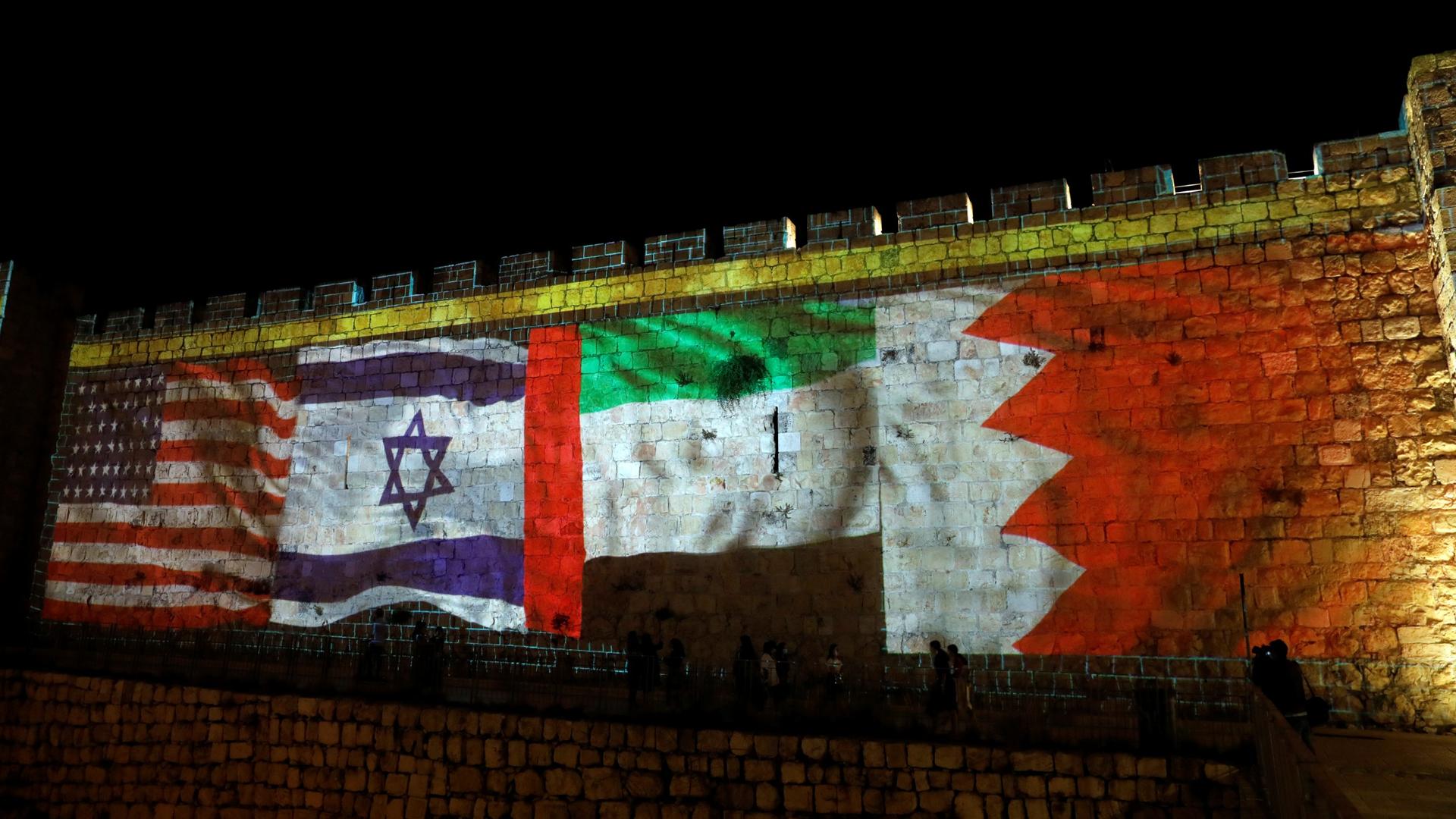Israel hoping to boost regional security with Abraham Accords
The national flags of Bahrain, UAE, Israel and the US are projected onto the walls of Jerusalem’s Old City, Sept. 15, 2020.
The United Arab Emirates and Bahrain on Tuesday became the first Arab states in years to break a long-standing taboo when they signed White House agreements toward normalizing relations with Israel.
This caps a dramatic month when first the UAE, and then Bahrain, agreed to reverse decades of ill will without any resolution of Israel’s decades-old dispute with the Palestinians.
Related: Historic flight between Israel and the UAE lands in Abu Dhabi
The World’s host Marco Werman spoke with Ya’akov Amidror, Israel’s former national security adviser, for more context on the Abraham Accords.
Marco Werman: What does Israel get out of these deals with the UAE and Bahrain?
Ya’akov Amidror: First of all, Israel is getting the ability to cooperate with two more important Arab states that understand Israel is a fact in the Middle East, a strong country with the capabilities to cooperate with. And this cooperation is not like in the past, under the table. It is on the table. And you know that in the Middle East, under the table was very crowded. Now, some of the partners who worked together under the table are going to work together formally, with diplomatic relations, and full capacity of economic relations.
So, you sound fairly optimistic, but there are some things that I wanted to press you on. What are the national security implications for Israel with this deal?
The more Arab countries that have good relations with Israel, the easier it will be for Israel and for those other countries to contain their [common] threats in the Middle East. And in the Middle East there are two main kinds of threats now. One, led by Iran, based on its Shiite dream, is to have a Shiite crescent from Tehran to the Mediterranean. And the other one is the [neo-]Ottoman Empire, dreams of the Turks with the ideology of the Muslim Brotherhood. And those two non-Arab states are a great threat to the area. Cooperation between those Arab countries which will have these [overt] relations with Israel, is making the ability to contain those two threats much better than before.
On the issue of weapons sales, Prime Minister Netanyahu said his government would oppose any sale of American F-35 warplanes to the UAE, despite forging relations with the Emirates. President Trump said just today in an interview with Fox News that he would have no problem selling the planes to the UAE. So, how would that affect Israel’s security?
I want to remind everyone that America is a sovereign state and America will do what is in the interests of the United States of America. We have an agreement with the Americans, and there is an American law, that the White House should report every year to Congress that Israel is keeping its qualitative military edge. I’m sure that if the Americans decide to sell the F-35, then the Americans and the Israelis, together, will negotiate compensation for Israel to preserve the Israeli qualitative edge.
We’re kind of talking in abstract terms here because the details of the deals are not public. The Emirati foreign minister did say today that the agreement mentions the two-state solution. What do you make of that?
I don’t know what will be said. But remember that in the American plan, which was adopted by the Israeli government, one of the elements was a Palestinian state. The problem is that the Palestinians are not ready to negotiate, because we want to be sure that our security will remain in our hands, that the Jordan Valley will remain under Israeli control, and so on and so forth.
But Palestinians are aggrieved by this agreement because they feel the UAE has undermined what they clearly see as a priority. Right?
This is the tragedy of the Palestinian[s]. They thought that they have the key to the future relations in the Middle East. And slowly, slowly, they understand that they lost it because they refused to negotiate with Israel through the years. They are not missing any opportunity to miss an opportunity.
Did you imagine you’d see this treaty signed in your lifetime?
We worked very hard. When I was in the government, [I hoped] that would happen. I didn’t know when it would come, but we worked very hard that it will be a reality. And I’m more than happy that it happened.
This interview has been edited and condensed for clarity.
Our coverage reaches millions each week, but only a small fraction of listeners contribute to sustain our program. We still need 224 more people to donate $100 or $10/monthly to unlock our $67,000 match. Will you help us get there today?
